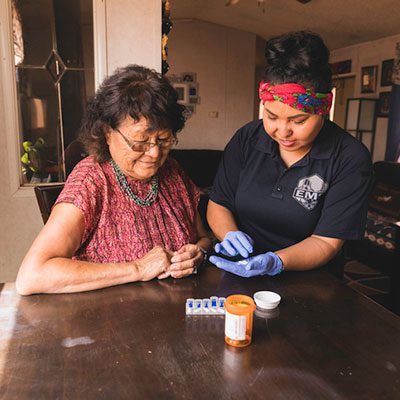Dementia is a concern for all aging populations, but it poses unique challenges for Native American communities. Older Native Americans experience increased rates of cognitive decline and dementia compared to other population groups due to their combined risk factors. To serve them well, healthcare professionals must understand their multiple risk factors and the importance of culturally competent care. We’ll outline the key stages of dementia care for Native Americans and offer guidance on how healthcare organizations, such as Indian Health Service (IHS) agencies, can best provide these services.
Why are dementia rates higher for older Native Americans?
A National Institutes of Health study found that over half of Native Americans aged 72-95 had some cognitive impairment, including up to 10% with dementia. Compared to rates in the general U.S. population, rates for Native Americans are significantly higher than those of other racial and ethnic groups.
Social determinants of health, such as poverty, environmental stresses, lower education levels, and higher incidences of inadequately treated vascular conditions such as hypertension and diabetes, all contribute to health disparities in Native American populations that can cause dementia. Long-term cognitive impairment can also stem from higher rates of substance use disorders, which can lead to Alzheimer’s disease and related dementias.
These combined multiple risk factors create a greater prevalence of dementia in Native Americans. In addition, the number of affected individuals will increase in the next few decades as the population of older Native Americans more than doubles by 2060. It will be more critical than ever to provide competent dementia care for this population group.
The stages of dementia
Greater awareness and education on the elevated risks of dementia in Native Americans can help healthcare providers develop more effective interventions. The following is a guide to the stages of dementia, the related needs for treating these potential cognitive conditions, and specific considerations for Native American patients, where applicable.
Early stage: Mild cognitive impairment
Identification and diagnosis: Early-stage dementia often begins with mild cognitive impairment, when individuals may experience subtle memory loss or confusion. In Native American communities, there may be a hesitation to report these symptoms due to stigma or a lack of understanding about the disease.
Culturally sensitive screening: Healthcare providers should use culturally adapted screening tools and involve family members in the assessment process. For example, incorporating traditional healers and elders can help bridge the gap between Western medicine and Indigenous practices.
Education and support: Early intervention is critical. Educating patients and their families about dementia, its progression, and available treatments can help manage the disease. Information should be provided in a way that respects cultural beliefs and practices. For example, the patient may prefer that providers share information with the patient’s whole family instead of just the patient alone.
Middle stage: Moderate dementia
Management of symptoms: As dementia progresses, patients may need help with daily activities and experience increased confusion or behavioral changes. Healthcare providers should develop care plans that incorporate traditional caregiving practices and respect the role of family and community in patient care.
Caregiver support: Native American families often take on caregiving roles, which can be a significant burden. Support groups, respite care, and caregiver training can help alleviate stress. Providing these services in a culturally relevant way, perhaps through partnerships with local tribal organizations, can increase their effectiveness.
Coordination of care: Patients may require coordinated care across various services, including primary care, mental health, and social services. Native American healthcare agencies or organizations can partner with local and regional healthcare providers to ensure seamless care transitions.
Late stage: Severe dementia
Palliative and end-of-life care: In the late stages of dementia, the focus shifts to comfort and quality of life. Healthcare providers should discuss advanced care planning early, ensuring that the patient’s wishes are respected. It is crucial to incorporate cultural practices around death and dying, which may include traditional rituals, the involvement of spiritual leaders, and an expressed preference for where the patient wishes to receive care.
Home-based and hospice care: Many Native American patients prefer to remain at home during the final stages of life. Healthcare organizations should work with families to provide home-based care services and explore options for hospice care that align with cultural preferences.
Best practices for healthcare organizations
The following five pillars can help you provide respectful and appropriate care for Native Americans with dementia.
1 – Cultural competence and sensitivity
Healthcare providers must be trained in cultural competence and the unique cultural, spiritual, and social needs of Native American patients. This includes recognizing the role of extended family and community in patient care and respecting traditional healing practices.
2 – Community engagement
Building trust within Native American communities is essential. Healthcare organizations should engage with tribal leaders, elders, and community members to develop programs that address the specific needs of the population. Community health workers who are members of the tribe can serve as valuable liaisons.
3 – Full access to care
Many Native American communities are in remote areas with limited access to healthcare services. IHS agencies and other organizations serving Native American communities should explore telehealth options, mobile clinics, or partnerships with regional hospitals to improve access to dementia care.
4 – Training and education
Continuous education for healthcare providers on the latest dementia care practices, in addition to training in cultural competency, is crucial. Offering workshops, webinars, and resources tailored to the needs of those serving Native American communities can enhance the quality of care.
5 – Support for families and caregivers
Providing resources and support for families and caregivers is also critical in managing dementia. Creating culturally relevant educational materials, offering respite care, and developing caregiver support networks within the community can help.
How Relias can help
Relias provides best-in-class healthcare education and training for all clinician and provider roles within your organization. We provide education across the care spectrum, including acute care, post-acute care, and behavioral health. In addition, we support your organization with a range of healthcare workforce enablement solutions for onboarding, assessment, continuing education, professional development, specialty certification, and compliance management.

Evidence-Based Government Healthcare Training Solutions
Relias can help your government organization improve patient care and outcomes with our proven, data-driven solutions. We support your clinicians on their journey to competency — and your organization’s journey to excellence.
Explore solutions →






